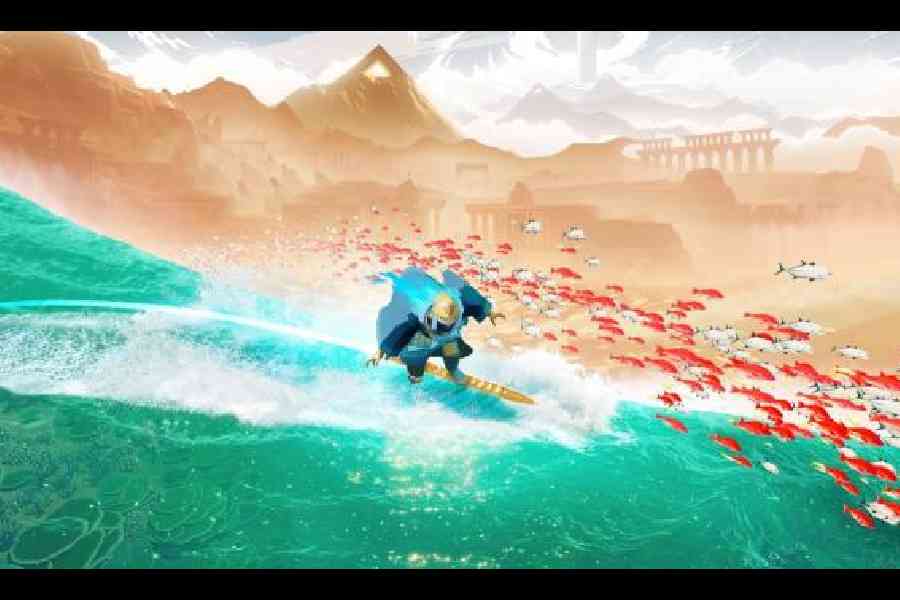Sand moves as if it were the sea, swirling, undulating and roiling like enchanted Atlantic storms. In the majestic game Sword of the Sea, which offers no audio dialogue and minimal readable text, it’s moving from the very beginning. A glowing blue whirlpool fills the screen and swirls hypnotically.
When the brown-cloaked, helmeted hero appears, a gleaming magic sword is in hand. Without explanation, that hero, the Wraith, transforms into a tiny drip of water, slowly dropping from a stalactite. Once the hero reaches land, the sword becomes a surfboard that zips along the sand as if on an endless wave. Immediately, you feel part of a deep adventure of the highest order.
Moving through a canyon with sand waterfalls, I easily learned to manoeuvre. At the base of an ancient column, hitting a glowing blue button with the hoversword made the sand turn into jade-green water. From beneath, a flotilla of swordfish arced into the air like a flock of birds. They led the way to the next challenge.
The swordfish provided a sort of entrancement, like visiting a natural wonder alone, where the stillness and immensity make you a small part of everything. I stopped to breathe deeply before I moved on.
The moment induced a familiar recognition of brilliance. Some of this game’s makers, including its director Matt Nava, had worked on Journey, the groundbreaking 2012 indie that was also set in a desolate desert. In that delicate contemplation of war, devastation and greed, the adventure was also largely silent.
Sword of the Sea is a subtle eco-fantasy in which you change sand to water to allow plants and fish to thrive as they did once before. Here, strands of kelp, which flourish once you release water into the desert, grow Jack and the Beanstalk-long.
With the hoversword, I was able to leap high on kelp from a watery canyon to a sandstone mountain ridge. There, I could observe the great expanse below and also hop and ride on giant chain links to discover another hidden area and a path almost buried by sand.
I hopped even higher by bouncing on giant blue jellyfish, fearful they might be poisonous bluebottles. But they were only there to lift me up. The greatest trepidation was that of falling far down. It happened a lot, but there was no ill effect, just a feeling of persistence to do better. That persistence — and acuity with the hoversword — comes in handy when dealing with a predatory leviathan, a black underwater centipede who turns fiery.
Explorable buildings have an Islamic influence, with one looking like the Chamber of the 12 Columns in Marrakesh, Morocco. Even when you’re trying to achieve lift from a tiled half-pipe to fly up to a room far above you, there’s a spiritual feeling present. It’s as if something glorious once happened here.
While Sword of the Sea’s morphing environs feel like total immersion in a carefully conceived world, the score from Austin Wintory enhances the restrained drama of this tender story. Wintory’s style, as meditative and healing as it is instructional and revelatory, is beloved by indie gamers. They have flocked to his live concerts to hear songs from bestsellers like Journey, Abzu and Flow.
Towards the end of Sword of the Sea, during a dramatic moment of near death, an angelfish approaches to revive the Wraith. Like a scene from Cinderella, the angelfish kisses your hand, twice, to replenish your life force. There’s nothing corny or strained about the scene. It doesn’t result in something as simple as respawning. Rather, it becomes a poignant comment on the world we share: if we all live together, we all must help one another to live.
There are some hiccups, like the flat attempts at poetry found on ancient stones. And the ending may be setting up a sequel that feels unnecessary. Nonetheless, so much of the experience shines, like the minigame with a sand-filled hourglass in which you perform skateboard-style tricks and collect pyramidal coins. Besting your high score before the grains run out is the goal. But in this metaphor-rich world, it means time is fleeting. Like sands through the hourglass, so are the games of our lives.
NYTNS











